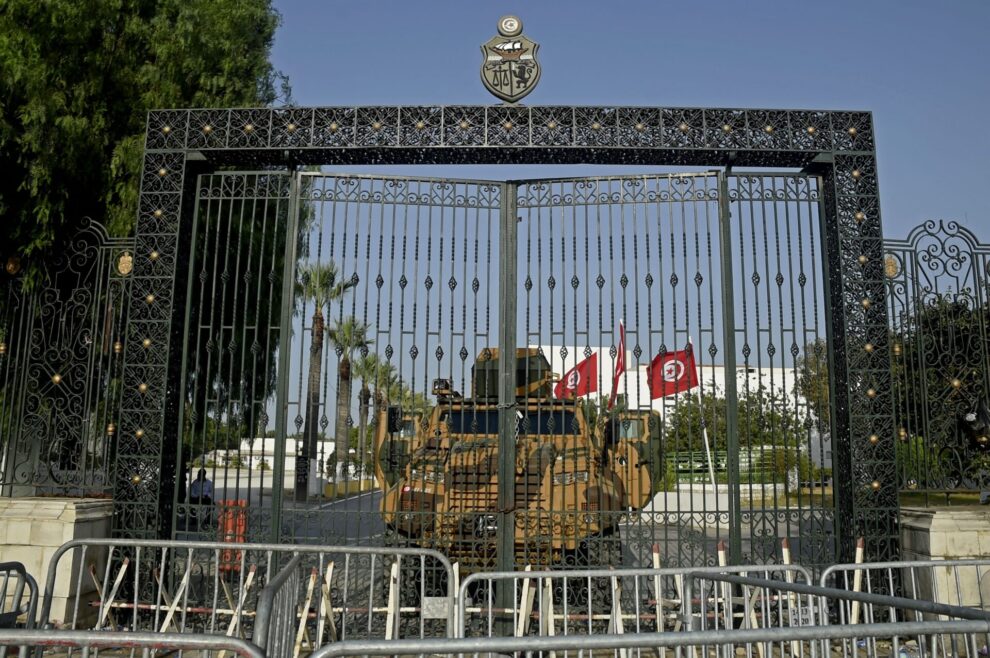Tunisian lawmakers must refrain from adopting a highly restrictive NGO law that, if passed, would threaten independent civil society organizations in the country, said Amnesty International today.
A draft NGO law, submitted by a group of MPs on 10 October, is due to be examined imminently by a parliamentary committee. The draft, which aims to replace the current NGO law of 2011, contains unnecessary and disproportionate restrictions on the formation, activity and funding of civil society organizations and threatens their independence by allowing the government to unduly interfere in their work.
“If adopted, this draft law would be a death sentence for the vibrant civil society that has bloomed in Tunisia since the 2011 uprising. Passing this law would take the country back to the Ben Ali era when the few authorized civil society organizations worked under severe restrictions and most international human rights organizations were not allowed to have a presence in the country,” said Heba Morayef, Amnesty International’s Regional Director for the Middle East and North Africa.
“The draft law grants executive authorities broad and unchecked powers that fly in the face of international human rights law and standards on freedom of association and remove essential safeguards against undue interference from the authorities. Regulators must comply with their international obligation to facilitate the work of civil society organizations, not diminish their independence by imposing excessive government oversight.”
One of the key reforms after 2011 was the adoption of Decree Law 88 which allowed for the establishment of NGOs by notification. Even though the draft law claims to maintain a notification rather than an authorization requirement for the formation of NGOs, it introduces an unclear, multi-layered and cumbersome registration process that undermines the principle of a notification system (Articles 7, 8 and 9) and is likely to result in unnecessary and disproportionate restrictions of the right to freedom of association.
It grants the broad discretion to the NGO directorate within the Prime Ministry to object to an organization’s establishment within one month after they register their notification, during which time the organization is not yet permitted to operate According to international standards, all associations including those not registered should be able to operate freely. The grounds on which authorities can object the establishment of an organization are not defined in the draft law. According to the draft NGOs can appeal the denial in court but the modalities of appeal are not specified.
In practice, this amounts to a de facto authorization request for any newly formed civil society organization. International human rights standards on freedom of association require states to take measures to ensure that organizations can be formed through a notification or registration procedure. For example, according to the UN Special Rapporteur on the Rights of Peaceful Assembly and of Association recommends that the process of establishing an association should be “simple, easily accessible, non-discriminatory, and non-onerous or free of charge”.
The draft law also distinguishes between national and “foreign” NGOs and gives the Ministry of Foreign Affairs (MFA) the authority to grant licences to any foreign NGO prior to registration (Article 19). The law does not indicate the criteria that would be used to grant or deny licences, nor does it set deadlines for this process. The draft law further empowers the MFA to choose to grant temporary licences or revoke and suspend the licences at its own discretion (Article 20). Hence, registration of foreign organizations could be denied on any ground and without the right to appeal.
The current law establishes strong reporting and auditing requirements that, in theory, could be justified to ensure transparency. However, in article 18 of the new draft, national civil society organizations must obtain prior authorization from the government every time that they receive new foreign funding. Civil society organizations who do not comply with this requirement risk immediate suspension or dissolution (Article 24).
According to international human rights standards on freedom of association NGOs should be free to “seek, receive and use funding from natural and legal persons, whether domestic, foreign or international without prior authorization or other undue impediments.” The absolute discretion given to the government to authorize or deny funding requests of civil society groups may constitute a disproportionate restriction of the right to freedom of association, which is prohibited by Article 22.2 of the International Covenant on Civil and Political Rights (ICCPR).
Article 6 of the draft law stipulates that all NGOs operate under the “oversight and supervision” of the relevant government ministry. But this is not clearly defined by the draft. This broad undefined mandate granted to government ministries to supervise the work of civil society organizations has no clear boundaries and could open the door to intervention. These provisions would prevent civil society organizations from being able to operate independently and may result in discriminatory restrictions on the right to freedom of association by marginalized groups such as organizations working on minority rights.
The draft law also grants executive authorities disproportionate powers to suspend and even dissolve civil society organizations who are accused of not complying with the law, without the necessary judicial oversight. Article 24 empowers the prime ministry to “automatically dissolve” organizations suspected of “terrorism.”
“Tunisia’s current NGO law is in line with Tunisia’s commitments under international law and it has enabled vibrant and diverse civil society to operate independently and freely. Tunisian authorities must protect this legacy instead of reversing all the progress made with one piece of flawed legislation.” said Heba Morayef.
Source: Amnesty International









